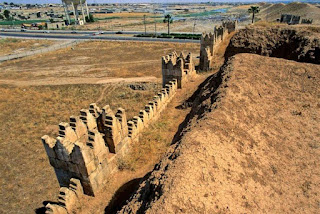What God Saw
Read Jonah 2-3.
So Jonah arrived in Nineveh, easily the last place he wanted to be on the entire Earth, and he did what God told him to do. He was, perhaps, the most unwilling prophet in the history of Hebrew prophecy. As Jonah walked through the city (it was a huge city—it took three days to see it all), he saw the enemy. Everywhere. Men, women, children, babies—they were all the enemy. They were all the ones who might, one day, come and destroy his homeland. They were all horrible, terrible, very bad people. He didn't have to talk to any of them to know that. He just knew. As he walked around, he saw all their flaws and their faults. He saw their mistakes and their missteps. He may have spent some humbling time in the belly of the big fish, but the only thing Jonah learned there was that you can't outrun God. Even though he got a second chance, he still didn't believe that the Ninevites were deserving of one.
But God saw things differently. God had threatened the destruction of the city. He had started this whole story, by calling Jonah to go and give Nineveh a second chance. Or maybe it was the third or the fourth. It was the last, that much is certain. For some reason, God believed Jonah had the right skills and abilities to be able to convince them this time, this last time, to repent, to turn away from their wickedness and at least begin to try to follow God's way. God saw potential in Jonah—unrealized potential, but potential nonetheless.
God also saw potential in the Ninevites. This powerful, imperial city—what might happen if its people turned from their wicked ways and began to live the way the creator of the universe wanted them to live? God saw hope, and more than that, in the end, God saw their repentant hearts (3:10). That's why God held back the judgment he had promised. God didn't break his promise to destroy; he fulfilled his promise to forgive.
And aren't we glad he saw the same thing in us and that he responded the same way? Aren't we glad God doesn't see things the way we see them? Maybe it's time we, like Jonah, learn to adjust our vision to see things the way God sees.
 |
| Reconstructed walls of ancient Nineveh |
But God saw things differently. God had threatened the destruction of the city. He had started this whole story, by calling Jonah to go and give Nineveh a second chance. Or maybe it was the third or the fourth. It was the last, that much is certain. For some reason, God believed Jonah had the right skills and abilities to be able to convince them this time, this last time, to repent, to turn away from their wickedness and at least begin to try to follow God's way. God saw potential in Jonah—unrealized potential, but potential nonetheless.
God also saw potential in the Ninevites. This powerful, imperial city—what might happen if its people turned from their wicked ways and began to live the way the creator of the universe wanted them to live? God saw hope, and more than that, in the end, God saw their repentant hearts (3:10). That's why God held back the judgment he had promised. God didn't break his promise to destroy; he fulfilled his promise to forgive.
And aren't we glad he saw the same thing in us and that he responded the same way? Aren't we glad God doesn't see things the way we see them? Maybe it's time we, like Jonah, learn to adjust our vision to see things the way God sees.


Amen!!! We are so fortunate we don’t get what we deserve.
ReplyDelete